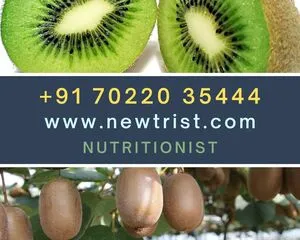What are the benefits and risks of eating kiwi during pregnancy? Know these details before eating kiwi during pregnancy.
The vitamin-rich fruit contains 17 mcg of folate making it an excellent choice to include in the diet. The neural tube defects that occur in the fourth to sixth week of pregnancy can be prevented by taking foods rich in folic acid.
Adding a few kiwis along with other fruits helps in meeting the daily requirements of folic acid.
One kiwi provides 64 mg of vitamin C which is required to strengthen immunity and for the absorption of iron from the foods.
Best Nutritionist in Bangalore
Consult 19-year-experienced Chief Nutritionist Vasanthi, in person at HSR, Koramangala, Bellandur, Haralur, Electronic city, or online across India.

Benefits and Risks of Kiwi During Pregnancy
Maintaining healthy levels of iron is crucial to prevent anemia and the formation of neurotransmitters that promotes healthy brain functions.
Kiwis are a good source of calcium which is not only needed for the formation of bones and teeth but also for the formation of muscles and the heart of the baby. 23.5 mg of calcium is obtained by adding kiwi to salads and smoothies during pregnancy.
Constipation and diarrhea are the two major issues faced during pregnancy. Kiwis help in regulating bowel movements and avoid discomfort.
Kiwi also provides the body with vitamin A, zinc, and omega-3 fatty acids which are essential nutrients during pregnancy.
Kiwi is considered a low-glycemic index fruit that does not cause a sudden spike in blood sugar levels. The vitamin K content of the fruit helps in faster healing and blood clotting during injuries. 27.8 mcg of vitamin K can be obtained from an average fruit.
Make sure your body gets enough of this vitamin as your due date gets closer. Avoid kiwi only if you are allergic to it. If you experience irritation in the mouth and throat after eating kiwi, stop eating it. Some may experience stomach pain and inflammation after eating it.
FAQs
Is it safe to eat kiwi during pregnancy?
The vitamin-rich fruit is safe to consume during pregnancy. The vitamin C content (64 milligrams/kiwi) helps in boosting immunity and effective absorption of iron which help in the prevention of anemia. The folic acid content makes it a super-fruit for consumption.
The only condition to avoid kiwis is allergies like skin rashes or swelling around the mouth.
Is kiwi good for the womb?
Prenatal birth abnormalities can be prevented with the consumption of folate-rich kiwi. Good iron absorption can help to maintain healthy levels of hemoglobin in the blood.
This ensures a sufficient supply of oxygen to the baby in the womb. Vitamin K promotes blood clotting and healing in the womb after childbirth.
Is kiwi good for the fetus?
Kiwi protects the fetus from growth defects and nourishes the baby with essential nutrients. Extra sources of folate-rich foods can assist the body to carry sufficient oxygen to the body cells and tissues of the mother and fetus.
You can enjoy up to 3 pears a day to satiate your sweet tooth and nourish the fetus with vitamins and antioxidants.
Can I eat kiwi at night during pregnancy?
Eating kiwi at night can improve sleep quality and health due to its antioxidant content and serotonin. Kiwis are low in calories and are highly nutritious.
Kiwi ensures proper digestion at night and lowers cholesterol levels. An increase in the rate of falling asleep was noticed with the consumption of kiwi at night.